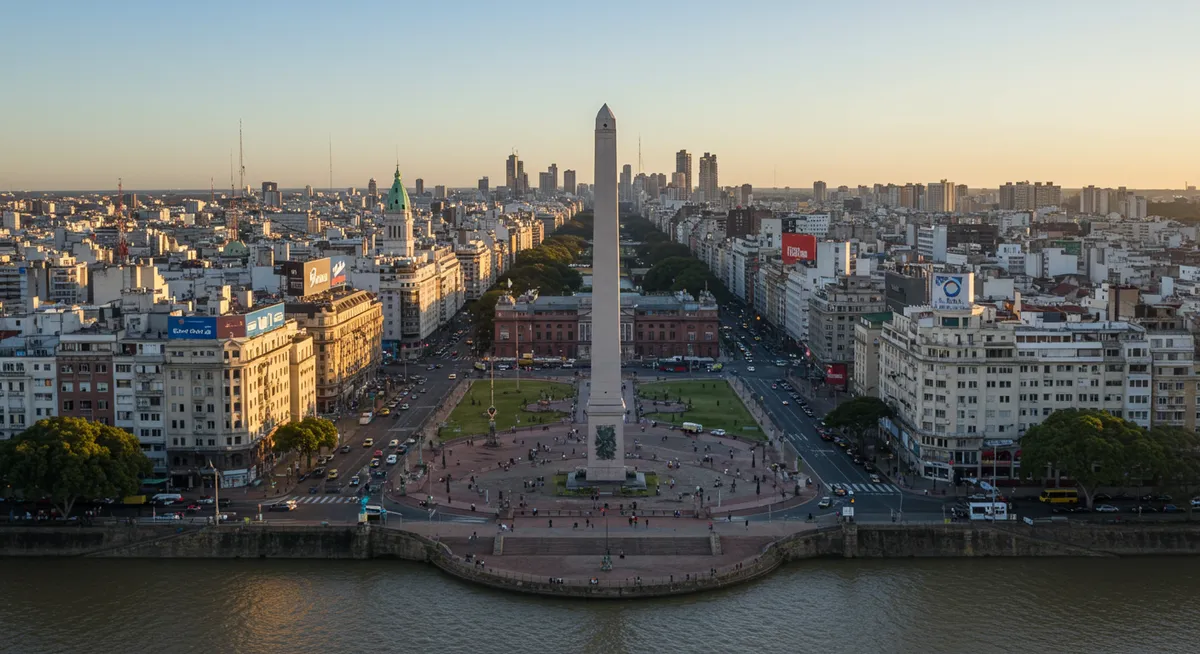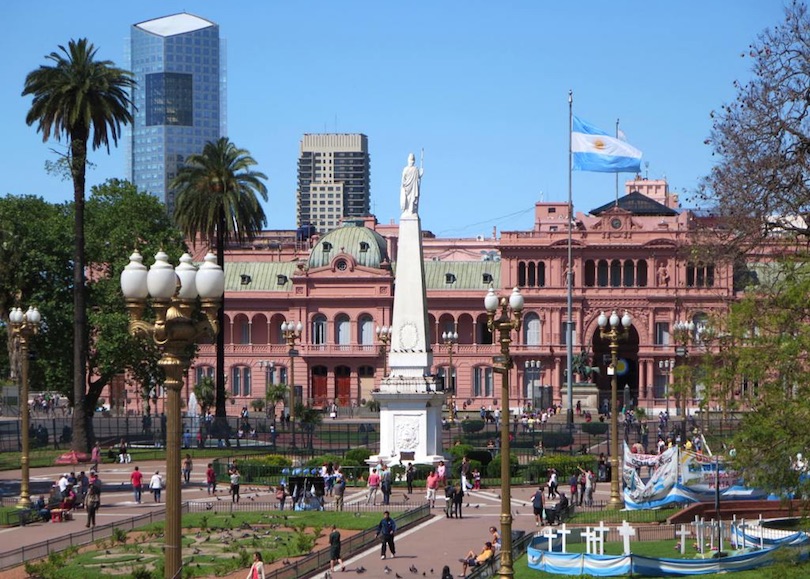
Buenos Aires, the dazzling capital of Argentina, is a city that pulsates with an intoxicating blend of European elegance and Latin American fervor. From its grand avenues and historic barrios to its passionate tango dancers and world-class cuisine, Buenos Aires offers a captivating experience that lingers long after you’ve departed. This sprawling metropolis, often referred to as the "Paris of South America," is a tapestry woven with rich history, artistic expression, and an undeniable zest for life.
A Journey Through Time: The Rich History of Buenos Aires
The story of Buenos Aires is one of resilience, ambition, and transformation. Founded twice, first in 1536 by Pedro de Mendoza and then definitively in 1580 by Juan de Garay, the city’s early years were marked by struggles for survival and strategic importance as a Spanish colonial port. Its geographical location on the Río de la Plata made it a crucial hub for trade, and over centuries, it blossomed into a cosmopolitan center.

Related Articles about Buenos Aires: A Symphony of Passion, History, and Vibrant Culture:
- Ho Chi Minh City: A Symphony of Saigon’s Spirit – Your Ultimate Travel Guide
- Greece: Where Ancient Wonders Meet Azure Dreams – Your Ultimate Travel Guide
- Manchester: A City Reborn, Brimming with Culture, History, and Unforgettable Attractions
- Whispers of the Past, Elegance of the Present: Discovering Kyoto’s Finest Hotels and Timeless Treasures
- A Journey Through Enchantment: Your Ultimate Travel Guide to Malaysia
The 19th century witnessed significant growth and immigration, particularly from Italy and Spain, which profoundly shaped the city’s architecture, language, and cultural identity. Buenos Aires became a beacon of opportunity, attracting millions seeking a better life. This era also saw the rise of its distinct political and social landscape, with periods of both democratic progress and authoritarian rule.
The 20th century brought with it the golden age of tango, a genre born in the city’s working-class neighborhoods, and the emergence of influential literary and artistic movements. Despite facing economic challenges and political upheaval, Buenos Aires has consistently demonstrated an indomitable spirit, reinventing itself and retaining its charm. Today, its history is palpable in every cobblestone street, grand plaza, and ornate building, offering a captivating narrative to those who explore its depths.
Unveiling the Gems: Top Attractions in Buenos Aires
Buenos Aires boasts an embarrassment of riches when it comes to attractions, catering to every taste and interest. Here are some of the absolute must-sees:
1. Plaza de Mayo: The Heartbeat of the City
This iconic plaza is more than just a public space; it’s the historical and political epicenter of Argentina. Dominated by the Casa Rosada (Pink House), the presidential palace, it has witnessed centuries of pivotal moments, from independence celebrations to mass protests. Adjacent to it are the Metropolitan Cathedral, a neoclassical marvel and the resting place of General José de San Martín, and the Cabildo, the former town hall. Simply strolling through Plaza de Mayo offers a profound connection to the nation’s past and present.
2. La Boca & El Caminito: A Kaleidoscope of Color and Tango
The vibrant neighborhood of La Boca is a feast for the senses, most famously embodied by El Caminito, a pedestrian street lined with brightly painted corrugated iron houses. Once a bustling port area, it has transformed into an artistic haven, filled with street artists, tango dancers performing impromptu shows, and souvenir shops. The aroma of grilled meats and the infectious rhythm of tango fill the air, making it an unforgettable experience. Don’t miss the iconic La Bombonera stadium, home to the legendary Boca Juniors football club.
3. Recoleta Cemetery: An Ethereal City of the Dead

Far from being somber, Recoleta Cemetery is an extraordinary open-air museum and a testament to the city’s opulent past. This labyrinthine necropolis is home to elaborate mausoleums and ornate tombs of Argentina’s most prominent figures, including Eva Perón. Wandering through its marble alleys, adorned with sculptures and stained glass, is a surprisingly beautiful and contemplative experience.
4. San Telmo: Bohemian Charm and Antiques Galore
San Telmo is Buenos Aires’ oldest barrio, retaining its colonial charm with cobblestone streets, antique shops, and historic buildings. On Sundays, the San Telmo Market transforms the neighborhood into a bustling hub of activity, with vendors selling everything from antiques and artisanal crafts to street food and live music. It’s the perfect place to soak up the bohemian atmosphere, find unique treasures, and witness impromptu tango performances.
5. Teatro Colón: A Jewel of Operatic Grandeur
Widely considered one of the world’s finest opera houses, the Teatro Colón is an architectural masterpiece and a cultural institution. Its horseshoe-shaped auditorium boasts exceptional acoustics, and its opulent interior, adorned with gilded details and intricate frescoes, is breathtaking. Even if you don’t attend a performance, taking a guided tour is highly recommended to appreciate its grandeur.
6. Palermo: Green Escapes and Trendy Vibes
Palermo is Buenos Aires’ largest neighborhood and a diverse district offering something for everyone. Its expansive green spaces, including the Bosques de Palermo (Palermo Woods) with its serene lakes and rose gardens, provide a welcome respite from the urban bustle. Palermo also boasts trendy boutiques, hip cafes, vibrant nightlife, and the renowned Jardín Japonés (Japanese Garden), a tranquil oasis of meticulously manicured landscapes.
7. Puerto Madero: Modern Waterfront Charm
Once a neglected industrial port, Puerto Madero has been revitalized into a sophisticated waterfront district. Gleaming skyscrapers, trendy restaurants, chic bars, and a lively promenade line the docks. The iconic Puente de la Mujer (Woman’s Bridge), a modern marvel of engineering, is a prominent landmark. It’s a great place for a leisurely stroll, a delicious meal with waterfront views, or to admire the contrast between old and new Buenos Aires.
8. MALBA (Museo de Arte Latinoamericano de Buenos Aires): A Celebration of Latin American Art
For art enthusiasts, MALBA is a must-visit. This contemporary museum houses an impressive collection of Latin American art from the early 20th century to the present day, featuring works by renowned artists like Frida Kahlo, Diego Rivera, and Tarsila do Amaral. Its modern architecture and thought-provoking exhibitions make it a significant cultural hub.
Navigating the Metropolis: Travel Tips for Buenos Aires
To make the most of your Buenos Aires adventure, keep these practical tips in mind:
- Currency: The official currency is the Argentine Peso (ARS). It’s advisable to carry some cash, but credit cards are widely accepted in most establishments. Be aware of the fluctuating exchange rate and consider using informal exchange houses (cuevas) for better rates, but exercise caution.
- Language: Spanish is the official language. While many people in tourist areas speak some English, learning a few basic Spanish phrases will greatly enhance your experience.
- Safety: Buenos Aires is generally safe, but like any major city, it’s important to be aware of your surroundings, especially in crowded areas. Avoid displaying expensive jewelry and be mindful of pickpockets.
- Tipping: Tipping is customary in Argentina. A 10% tip is standard in restaurants and cafes, often already included in the bill as "servicio." For other services, a small tip is appreciated.
- Siesta Culture: While not as prevalent as in smaller towns, some smaller shops might close for a few hours in the afternoon. Plan your shopping accordingly.
- Power Adapters: Argentina uses Type I outlets (the same as Australia and New Zealand) with a voltage of 220V.
Resting Your Head: Accommodation Options
Buenos Aires offers a diverse range of accommodation to suit every budget and preference:
- Luxury Hotels: For those seeking indulgence, areas like Recoleta and Puerto Madero offer world-class hotels with impeccable service, stunning views, and top-notch amenities.
- Boutique Hotels: The charming neighborhoods of Palermo and San Telmo are dotted with stylish boutique hotels that exude character and offer a more intimate experience.
- Mid-Range Hotels: You’ll find a plethora of comfortable and well-located mid-range hotels throughout the city, offering good value for money.
- Hostels: Buenos Aires has a thriving hostel scene, perfect for budget travelers and those looking to socialize. Many offer private rooms as well.
- Apartment Rentals: For longer stays or for those who prefer to have their own space and kitchen facilities, renting an apartment through platforms like Airbnb is a popular and convenient option.
Getting Around: Transportation in Buenos Aires
Buenos Aires boasts an efficient and extensive public transportation system:
- Subte (Subway): The Subte is an excellent way to navigate the city, with six lines covering most major attractions and neighborhoods. Purchase a "SUBE" card, which can be recharged and used for all public transport.
- Buses (Colectivos): The bus network is vast and reaches even further than the Subte. They are a cost-effective way to travel, but can be crowded during peak hours.
- Taxis: Taxis are readily available and are a convenient option, especially for shorter distances or when traveling late at night. Ensure the meter is used.
- Ride-Sharing Apps: Services like Uber and Cabify operate in Buenos Aires and offer a convenient alternative to traditional taxis.
- Walking: Many of Buenos Aires’ most beautiful neighborhoods are best explored on foot. Wear comfortable shoes and embrace the discovery!
- Bicycle Rental: For a more active experience, consider renting a bicycle. Palermo and Puerto Madero offer dedicated bike paths.
When to Visit: The Best Time to Experience Buenos Aires
Buenos Aires experiences a temperate climate with four distinct seasons, each offering a unique appeal:
- Spring (September to November): This is arguably the most pleasant time to visit. The weather is mild and sunny, with blooming jacaranda trees painting the city in vibrant purple hues. Outdoor activities are enjoyable, and the city is alive with a renewed energy.
- Summer (December to February): Summers are hot and humid, with temperatures often exceeding 30°C (86°F). While it can be uncomfortable for some, it’s also a lively time with festivals and outdoor events. Be prepared for heat and stay hydrated.
- Autumn (March to May): Another excellent time to visit, autumn offers pleasant temperatures and fewer crowds than spring. The foliage turns into beautiful shades of red and gold, creating a picturesque backdrop for exploring the city.
- Winter (June to August): Winters are mild and generally dry, with average temperatures around 10°C (50°F). While not as vibrant as other seasons, it’s a good time for cultural activities, enjoying cozy cafes, and experiencing the city without the summer crowds.
A City That Captivates
Buenos Aires is more than just a destination; it’s an experience that ignites the senses and touches the soul. From the melancholic beauty of tango to the grandeur of its architecture, from the warmth of its people to the richness of its history, this city offers a captivating journey that will leave an indelible mark on your memory. So pack your bags, open your heart, and prepare to be swept away by the passionate embrace of Buenos Aires.





